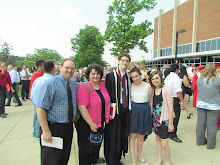I have been thinking a lot about church growth lately. I would love to see Northeast grow but even more than that I would love to see Churches of Christ emerge from what has been a period of plateau and decline to begin growing once more. I don't have any illusions that it will be easy. Churches have already begun the process of making painful changes in order to spur growth within their bodies. Some have gone to praise teams and even to an instrumental worship service to attract those who identify with that worship style. Others have re-evaluated traditional CofC stances on doctrine and issues to see if there are Biblical ways to reconnect with a culture that seems to be moving away from us. They have looked at issues of the women's role in the church, instruments in worship and even baptism in an effort to be more effective in reaching out to others. Some of these churches have made radical changes leaving them to appear very dissimilar to the church we knew in the 60's and 70's or even 80's for that matter. Some Churches of Christ seem to be adopting the current "Community Church" model. They have seen some success in reaching the unchurched and have undergone a time of phenominal growth. Those of us who have been observing this and the sometimes heated discussions surrounding it are asking, "is all this necessary for churches to realize sustained growth?"
Personally I do not stand in judgement of those who try new things and who find it expedient to think outside of the traditional CofC box. I am encouraged when churches are seeking ways to get the gospel into the hands of the lost and praise God when a lost sheep is returned. The one aspect of this with which I am completely uncomfortable with is the supposition that one must do away with the traditional/conservative views of the congregation in order to move forward. It saddens me to hear of congregations where the leaders announce that they are trying some new things and those who differ can leave. That just seems pattently unfair especially to those senior saints who have worked their entire lives to build some of these churches and are summarily dismissed because their views differ and they are slow to change. I can't believe that this is God's will.
I do believe that change is in order for our churches but it may not be the kind of change I discussed above. I am a big fan of praise teams and I like listening to Christian music with or without instruments. But I have not been an advocate of bringing either one into our church. The change I think is of primary importance is in the tendency of most churches to be homogenous in membership. We are typically white, upper middle class, well educated, urban and conservative. Tell me if this isn't true of most everywhere you have been. Unfortunately, we struggle accepting anyone who doesn't look like us. If a person of color or someone living in poverty walks into a service, they often see right away that they are out of place. Members often greet them briefly or not at all. If someone from a different religious background speaks up in a Bible class espousing something different than what we believe the shock in our faces is noticable. They are quickly silenced and often just as quickly move on to another church. This is a change we had better address before we even begin thinking of changes in our worship style or traditions. Until our congregations begin to universally diversify we limit our opportunities for growth and unwittingly tell several classes of people for whom Jesus died that they are unwelcome in our churches. What a shame that would be.
Might you become a change agent in your church? What would it be like for a few members to begin thinking of what it would take for their congregation to be more accepting of those who are demographically different from the majority of folks in their congregation? What if they began to look at their church through the eyes of a visitor who is of a different race or speaks a different primary language or runs in different socio-economic circles? What does the church need to do in order to for that person to enter and feel the love of Jesus surround them through what they see and experience?
Perhaps some reading this are members of a church that is diverse and reaches people from many different demographic categories and God bless you if you are. For most of us however, we have a long way to go.
Subscribe to:
Post Comments (Atom)





1 comment:
I think most churches should be flexible enough to spiritually feed people in "different places" on the theological continuum. I think the task is a little different when we start talking about seeking racial and socio-economic diversity.
It is interesting that after all of the de-segregation of the 50's through the 70's, the institution that has remained the most segregated is the church. Even in cities that have less racial tension than Cincy there are plenty of "white" or "black" or "{insert ethnicity here}" congregations. I figure most people just go where they are comfortable.
Post a Comment